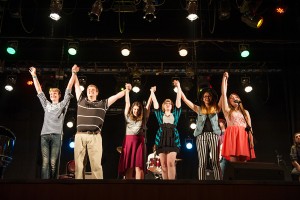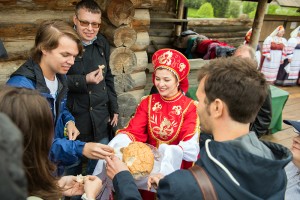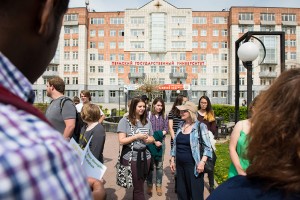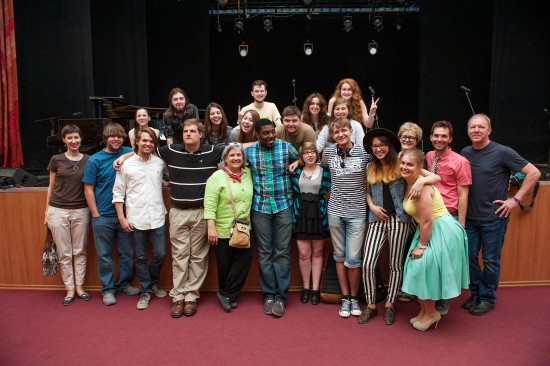 Students from the Delta Music Institute celebrate with students from Perm Statue University in Russia after a successful concert May 29 organized through the international exchange "Rivers of Music — Rivers of Culture."
Students from the Delta Music Institute celebrate with students from Perm Statue University in Russia after a successful concert May 29 organized through the international exchange "Rivers of Music — Rivers of Culture."Delta State University recently completed an international exchange program with its partner university Perm State University in Perm, Russia from May 22-June 1. Delta State’s group was invited by Perm State within the framework of the “Rivers of Music — Rivers of Culture” project, a part of the U.S.-Russia Peer-to-Peer Dialogue Program and supported by a grant from the U.S Department of State.
The two institutions have been developing the partnership since November of 2013 thanks to the hard work of Delta State President William N. LaForge and Svetlana Polyakova, program coordinator from Perm State. LaForge has visited Perm State three times in recent years — once in 2008 as a visiting professor in the Center for International Legal Studies program, and twice as a Fulbright Fellow in 2011 and 2015.
During the most recent exchange, called the Permski Krai Immersion Experience, six students from Delta State’s Delta Music Institute took part in the trip to Perm. These students included: Jessica Faith Wishard, Jarrick Finkley, Leelah Dill, Justin Boatman, Ty Young and Brandon Mosley. Additionally, seven Delta State faculty and staff members attended the trip: Tricia Walker, Charly Abraham, Miles Fulwider, Barry Bays, Robin Boyles, Beverly Moon and Rory Doyle.
The first component of Rivers of Music — Rivers of Culture included a visit from Perm State students and faculty in October of 2014, who attended Delta State’s inaugural International Conference on the Blues and additional Bridging the Blues events. This portion of the program was coined the Mississippi Delta Immersion Experience.
The second component continued throughout the spring semester with a telebridge project, a series of webinars between both universities. Utilizing music as the universal language, both groups took part in virtually streamed classes focusing on the cultures, histories and heritages of the two countries.
During the recent Permski Krai Immersion Experience, the Delta State group was able to participate in Perm’s festival season and provide a mini summer Delta Music Institute camp to Perm students.
The main goal of the DMI camp was to produce a public concert at the PSU Students’ Palace of Culture at the end of the camp session. The concert featured performances from both Perm State and Delta State students as a final stage of this intensive international program. In the week leading up to the concert, the participants held four joint rehearsals before the performance on May 29.
“At the concert you could hear songs in the style of traditional Russian folk music and American blues of the Mississippi Delta region,” said Polyakova.
The Russians participating in the camp included: Katya Ilynykh, violin; Katya Konstantinova, key piano; Dmitry Dementiev, bass guitar; Uliana Grebenschikova, clarinet; Daniel Mansvetov, bongo, cajon, harmonica; Dasha Krasilnikova, vocals; Aleksandra Popova, vocals; Marina Aksenova, vocals; Igor Kopylov, vocals, songwriter; Ksenia Mazitova, vocals; and Eugeni Zherebtsov, songwriter.
DMI faculty are now in the process of producing an official recording of the concert.
The DMI students also participated in the Red Sail Festival of songwriters in the village of Shadeika near Kungur. This unique opportunity allowed the students to perform on stage to an audience in rural Russia. Once again, both Delta State and Perm State students joined together for the performance.
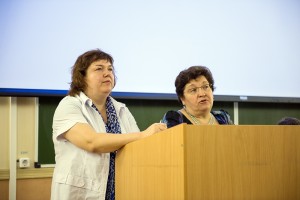
Polyakova (left) and Ilynykh leading the conference “Rivers of Music — Rivers of Culture: At the Cultural Crossroads.”
Another highlight event during the visit was Delta State’s participation in the conference “Rivers of Music – Rivers of Culture: At the Cultural Crossroads,” in which the American students and professors participated in the plenary session and attended four sections. Around 70 participants attended the successful conference.
Special interactions occurred at school No. 6, where the group met Russian schoolchildren aged 9-16. Alla Podolskaya, director of music programs at the school, organized a thorough performance highlighting the musical talents of the students.
“They enjoyed many other visits and excursions organized by the students of Foreign Modern Languages and Literatures, Faculty of Philosophy and Social Sciences and the Faculty of Law,” said Polyakova.
One noteworthy trip in the Perm region was a visit to the architectural and ethnographic open-air museum called Khokhlovka. Founded in 1969 and opened for visitors in 1980, it is the first open-air architectural museum of wooden architecture in the Ural region, and includes 23 unique monuments from the 17th through early 20th centuries.
Additionally, the Delta State group was exposed to a number of interesting cultural events during the Diagilev Festival in Perm. The group attended five events in the Perm Opera and Ballet Theatre and were guided through two excursions of the Perm Art Gallery.
The detailed schedule would not have been successful without the joint efforts of Perm State faculty and students. Along with Polyakova’s role as PSU program coordinator, the committee included: Olga Ilynykh, vice rector; Svetlana Zhdanova, head of the Development Pshychology Department; Elena Gritsenko, associate professor of English in the Language and Intercultural Communication Department; Michail Bakharev, faculty of law; Anna Shavkunova, Lubava Puzireva and Ekaterina Ilynykh, faculty of Philosophy and Social Sciences; Daria Krasilnikova, Artem Gorin and Ivan Shardakov, faculty of Law; and others.
“The Americans liked everything — organization, food, accommodation, transport and the field trips,” said Polyakova. “They praised the level of English of non-linguists, although the linguistic support was organized by the Faculty of Foreign Modern Languages and Literatures, including Kristina Kostina, Anna Poryadina, Marina Aksenova, Elena Trushnikova and others.”
After the group departed Perm, they continued the exchange with a three-day tour of Moscow.
“One of the outstanding results, and a sign of a special recognition of the program, was the invitation of the DSU group to a meeting at the U.S. Embassy in Moscow, where the students sang the original song of our project, “We are one,’” added Polyakova. “But the most important thing for all the participants is the friendship and good social and cultural relationships they have grown thanks to the program. It is an inspiring and unforgettable outcome.”
Before the trip, Delta State’s Office of Communications and Marketing established a program blog at https://www.deltastate.edu/russia. DMI students and teachers shared their impressions about Perm and Perm State throughout the journey. Read more of these impressions and view trip photos on the blog.
Follow all news of the exchange at www.deltastate.edu as both institutions will continue to explore future developments.

